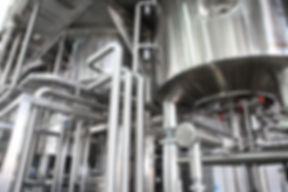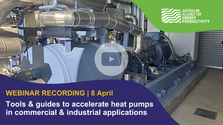
HEAT PUMPS FOR INDUSTRIAL AND COMMERCIAL APPLICATIONS
Decarbonising process heating and cooling is a critical challenge as we work towards net zero targets. Australian industry accounts for 44% of the nation’s end-use energy and 52% of that is for supplying process heat with natural gas as the leading source of energy.
Already there are commercial, proven industrial heat pump and thermal battery technologies that can supply required process heating and cooling, as well as the energy reliability and flexible to maximise renewable and demand response benefits.

Heat pumps can be used for a range of industrial, commercial and residential applications, for providing both heating and cooling. Until recently, heat pumps were only considered viable for lower (less than 120 °C) temperatures, however, that temperature range is increasing with high temperature heat pumps now being developed and tested for high-heat applications such as drying of building products.
Tools for planning industrial and commercial heat pump systems
Access A2EP's online Heat Pump Estimator
Our Heat Pump Estimator tool has been designed to aid Australian businesses in sizing heat pumps and thermal storage to replace gas boilers. This simple-to-use online tool gives business decision-makers the basic information they need to understand if a heat pump system is basically technically and economically viable for their business, and to start a conversation with an energy consultant or heat pump provider and get the ball rolling. Access the Heat Pump Estimator
Heat pump refrigerant guide
This guide explains the limitations of certain refrigerants due to issues such as flammability and global warming potential (GWP) and a refrigeration choice decision tree to simplify the selection process. Download the Heat pump refrigerant guide.
Retrofitting commercial buildings with heat pumps: a how-to guide
This guide takes you through the steps of assessing heat and site requirements for heat pumps for commercial buildings, as well as essential actions to undertake before sizing up your system. Download the retrofitting guide for commercial buildings.
Measurement and verification guide for heat pump projects for certificate creation
Proper metering and subsequent measurement and verification is vital for assessing the outcomes of a heat pump project and also to create revenue via the different certificate scheme available in Australia. Download the measurement and verification guide for heat pump projects.
Decarbonising heat pump product development in Australian commercial and industrial sectors
This is the final report for the RACE for 2030 Decarbonising heat with heat pumps project. It presents the latest developments on commercial and industrial heat pumps and near-future industry growth.
Heat pump case studies
NEW VIDEO CASE STUDY: Port Phillip Estate and Kooyong Wines, Victoria
Restaurant, accommodation & function centre | Domestic hot water
St John of God Hauora Trust care home, Christchurch, New Zealand
Multiunit residential | Domestic hot water
View the case study on FutureHeat.info
Alliance Group Nelson plant, New Zealand
Meat processing | Process hot water
View the case study on FutureHeat.info
Timaru Hospital (SCDHB), South Canterbury, New Zealand
Health facility | Heating | Sterilisation | Laundry
View the case study on FutureHeat.info
ANZCO Foods Canterbury, Ashburton, New Zealand
Meat processing | Process hot water
View the case study on FutureHeat.info
Hardwicks Meats processing site, Kyneton, Victoria
Meat processing | Process hot water
View the case study on FutureHeat.info
Cabarita Swimming Centre, Sydney, Australia
Pool water heating | Domestic hot water
View the case study on FutureHeat.info
More heat pump case studies: on FutureHeat.info
-
101 Collins St, Melbourne
- domestic hot water for multi-storey building -
Doone Kennedy Hobart Aquatic Centre
- water heating and thermal battery for aquatic centre -
Alliance Group meat processing facility
- water heating for sterilisation and cleaning
-
Beijing Municipal Administrative Centre
- district cooling and heating -
Montague fruit-packing facility
- heat for cleaning and preparing fruit
Recordings of recent heat pump webinars from A2EP
A2EP's work assessing and promoting the potential for heat pumps
Our research and demonstration projects looking at the potential of heat pumps to decarbonise industrial process heating and cooling extends back more than. We have produced a number of respected reports and worked on several key government projects looking at heat pumps. See below for more information and links to the reports and project outcomes and watch our recent webinar update on our renewable heat work with governments and industry.

Australian Heat Pump Roundtable
In 2023, A2EP established the Australian Heat Pump Roundtable to bring industry leaders and government representatives together to identify and discuss ideas for accelerating the transition to heat pumps in Australia's commercial and industrial sectors - as well as the obstacles that need to be overcome. The first meeting of the Roundtable was held in Sydney on 26 July and featured representatives from five different government agencies, industry associations for commercial and industrial sectors, four different research organisations, energy suppliers, finance, OEMs, consultants, contractors and finally end users across a broad spectrum of commercial and industrial sectors.
Renewable Energy for Process Heat Opportunity Study
In early 2019 with funding from the Australian Renewable Energy Agency (ARENA), A2EP initiated a project to determine the technical and commercial feasibility of replacing fossil-fuelled process heating technologies in manufacturing settings with renewables-powered alternatives, and to detail pathways to implementation including technical specification and a business case for investment.
A report delivered at the end of the study drew on the findings of 20 pre-feasibility studies and seven feasibility studies to demonstrate the economic and technical feasibility of heat pumps for low temperature heating applications. It identifies challenges to heat pump implementation and measures to address these challenges. Read the final report.
Futureheat.info web resource
As part of the Renewable Energy for Process Heat Opportunity Study project, A2EP developed the FutureHeat.info website to help build awareness of the benefits of industrial heat pumps, thermal batteries and other technologies to deliver renewable process heat and to build industry capacity for implementing these solutions across the country. The website includes technical information, case studies, tools and industry reports. Visit the FutureHeat website.
Harnessing heat pumps for net zero report
A2EP and the Energy Efficiency Council (EEC) joined forces to release a report – Harnessing heat pumps for net zero: The role of heat pumps in saving energy and cutting emissions. The research spotlights the critical role of heat pumps in the energy transition. The opportunity for heat pumps to help decarbonise key industrial subsectors is substantial; the report finds that emissions reductions of 391 Mt CO2-e in industrial processes are possible to 2050. Read the report.
Heat pump feasibility study for the NSW Government
As part of our ongoing work supporting state governments to deliver business decarbonisation and net zero programs, A2EP is delivering a heat pump feasibility study funded by the NSW Government. We visited the a2 Milk Company processing facility in Smeaton Grange, with several clean technology leaders including pitt&sherry, gTET (green Thermal Energy Technologies) and Minus40 Consulting Engineers.
Technical guidelines for air source heat pump water heaters
In 2022 A2EP was engaged by the Victorian Department of Environment, Land, Water and Planning (DELWP) to develop technical guidelines for commercial and industrial air source heat pump water heaters. The guidelines feature sector-specific advice and case studies for heat pumps in agriculture (dairy farms), aquatic centres and multi-unit commercial buildings. Along with the guidelines, A2EP delivered two webinars in support of heat pump activity under the Victorian Energy Upgrades.
Download the Technical Guidelines (PDF).
Visit the DELWP website for more information about hot water for businesses.
Heat pumps for aquatic centres
With gas prices rising rapidly, aquatic centres are a source of high costs and emissions for councils, swim schools and private schools. More and more are looking at heat pumps as an alternative efficient source of water heating which can enable the electrification of these facilities, utilisation of on-site renewable generation and as a way to use waste heat from other processes. While converting is not simple, it is not as costly as some may think.
A2EP has delivered a number of webinars and materials specifically looking at how to approach switching aquatic centres to heat pumps.
Watch our webinars and read the practical guidelines and case studies we have developed.
2xEP High temperature heat pumps for the Australian Food Industry report
With its partners, A2EP developed this report in 2017 to define the likely feasibility and range of applications for heat pumps in the food industry, with a focus on high temperature (HT) heat pumps delivering useful heat at 66 °C - 150 °C. This work was a continuation of the 2xEP project investigating the opportunities for innovation in technology/business models that could transform energy productivity in the food value chain. Heat pumps were identified as a key technology to enable the electrification of the food processing with their ability to recover heat from waste streams to boost temperatures, displace steam, and in some cases simultaneously provide process cooling.
Read this report on high temperature heat pumps for the Australian food industry.

.jpg)


.jpg)

.png)





























_Page_01.png)


.jpg)


